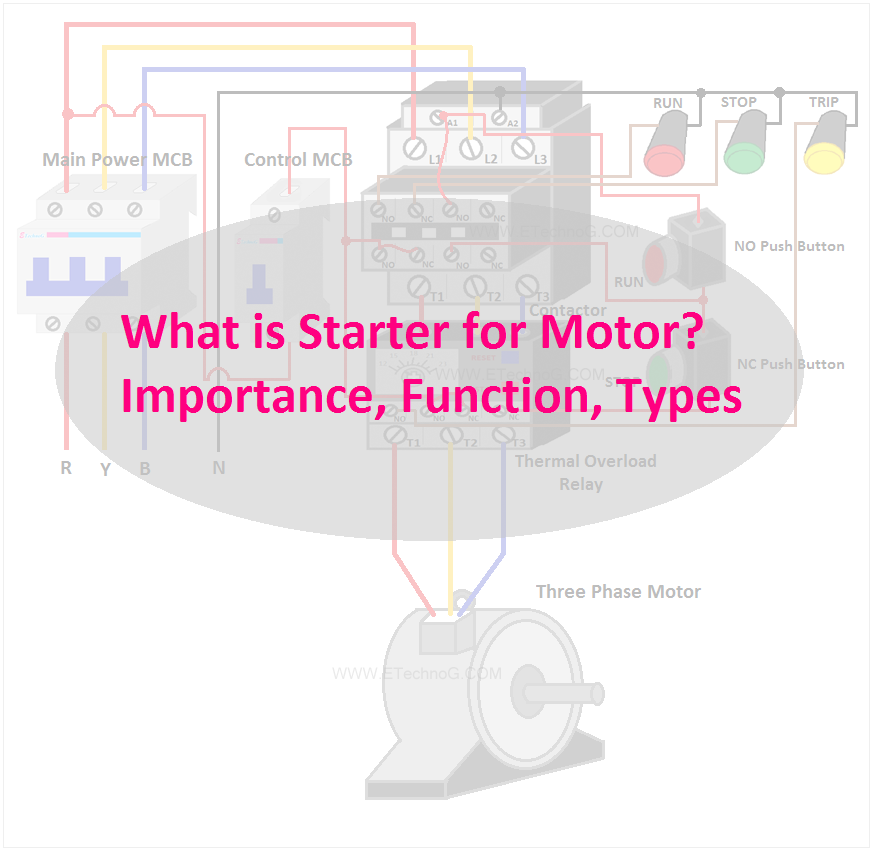What is Starter for Motor? Importance, Function, Types
A starter for motor is a device that helps to safely start and stop the motor. The starter is a switching device as well as a protective device. It provides both switching(turn on/turn off) and protective function. Even some motor starter comes with speed variation and direction control feature. Almost all the electric motor draws a very high current during their starting that can damage the winding of the motor. So, a motor starter is essential for the operation of an electrical motor. Starting of an electrical motor without a Starter is very risky.
Need or Importance of Motor Starter
Electrical motors are heavy electrical machines that convert electrical energy into mechanical in the form of rotational motion. They are used for so many useful applications such as to drive mechanical loads, operate rotating machines, water pumping, etc. Electrical motors are so much costly also. So, the damaging of an electric motor can make a huge loss.
If we connect a motor directly to the power supply, it will draw a very inrush current suddenly. This will cause so many harmful effects such as,
- Excessive heat may produce in the motor winding and motor circuits due to the high current flow.
- Sudden consumption of high current can create a voltage disturbance to the incoming supply that can affect the other loads connected to the same source.
- Motor winding and circuit conductors maybe get burned.
So, to prevent these harmful effects, a starter for the motor is required that can safely start the motor in the mean of by reducing the starting current.
The function of Motor Starter
1. It safely starts the motor by reducing the voltage or current at the starting of the motor.
2. It safely stops the motor.
3. Some of the starters have functions to vary the speed of the motor rotation such as Three Point Starter(DC Starter) and Four Point Starter(DC Starter).
4. Some of the starters have functions to change the direction of rotation of the motor.
5. Starter also can works as a protective device that means it automatically turned off the motor when overload or short circuit fault occurs.
6. To keep safe the costly electrical motors and the connected power system we need a starter for the motor.
Types of Motor Starter
There are different types of motor starters available. These motor starters are classified based on power supply types such as,
- AC Starter - works with AC supply
- DC Starter - works with DC supply
Based on the type of operation the types of starter are,
- Manual Starter
- Automatic Starter
Based on the starting method, the main types of starters used for AC Motor are,
- Direct On-Line(DOL) Starter
- Stator Resistance Starter
- Rotor Resistance Starter(also known as slip ring motor starter)
- Autotransformer Starter
- Star Delta Starter
- Soft Starter
- Variable Frequency Drive or VFD
Remember, above these are the AC starter means they are used for the AC motors such as induction motors. Among those, the DOL starter does not reduce the voltage or current at the starting of the induction motor, it just turns on or turns off the motor and gives protection against overload or overcurrent fault.
Some Examples of DC Motor Starter are,
- Two Point Starter
- Three Point Starter
- Four Point Starter
Read Also:
- MPCB Uses, Advantages, Connection | Motor Protection Circuit Breaker
- Working and connection diagram of Single Phasing Preventer.
- VFD Block Diagram, Applications, Advantages, Circuit, Panel
- What is Universal Motor Controller(UMC)? Features, Applications
- Soft Starter Wiring Diagram and Connection Procedure

